On X timelines, in Instagram comment threads, across WhatsApp group chats, and even in face-to-face conversations, one debate never seems to end: “Who’s the greatest Afrobeats artist?” Every corner has its loyalists, each ready to crown their favourite artist as the ultimate GOAT. The debate is constant and rarely ever settled.
So I wondered: what would happen if we asked artificial intelligence to weigh in? With AI now woven into daily routines—from productivity hacks to creative expression—it felt inevitable to test whether these systems could enter such a deeply cultural argument. Fans are already doing it casually, using Elon Musk’s Grok to taunt rival fandoms with AI-generated comparisons.
But my curiosity wasn’t just about who the models crowned. It was about why. What do their choices reveal about the data they rely on? Could their reasoning highlight something about how these systems interpret Nigerian culture?
The experiment
To find out, I turned to five AI models: ChatGPT, Gemini, Meta AI, Perplexity, and Grok. I gave each the same prompt:
“Rank the greatest afrobeats artists of all time, and explain your criteria.”
When the tools responded, I pressed further with a follow-up:
“Clarify your sources of knowledge. Show me the reasoning step by step with references to data points.”
Since these systems are trained on different data, I didn’t expect uniform responses.
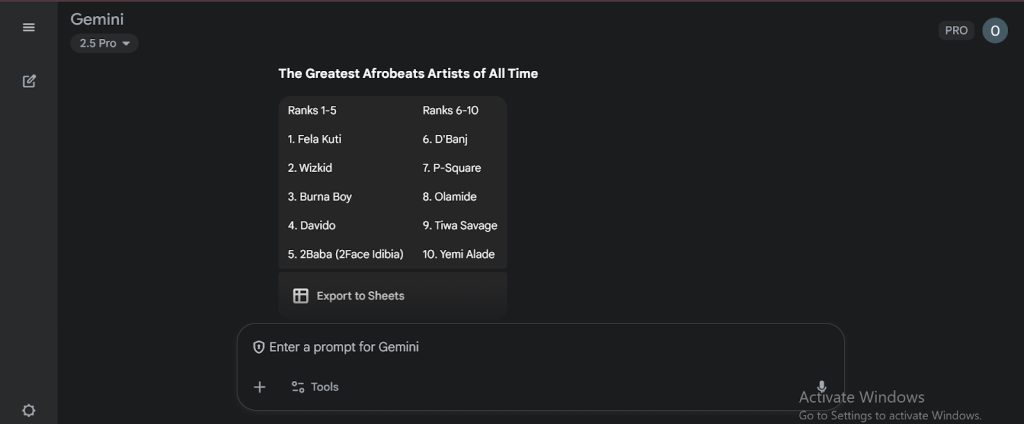
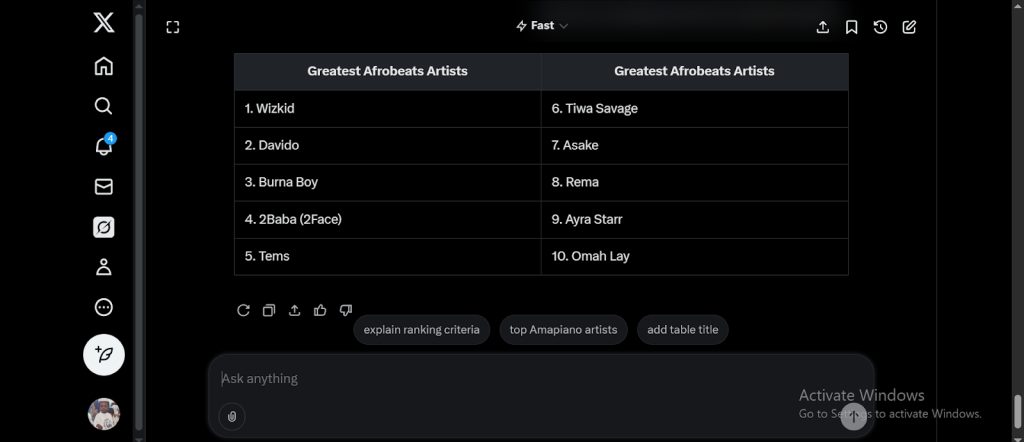
What AI revealed
What stood out the most was the inconsistency in the results. The same AI model often gave different responses if I pushed it further to justify its ranking. That inconsistency revealed that these models are constantly reshaping their answers to fit each prompt. Perplexity, for instance, initially crowned Wizkid the Afrobeats GOAT. But when asked to justify its reasoning, accompanied by sources, it handed the crown to Burna Boy.
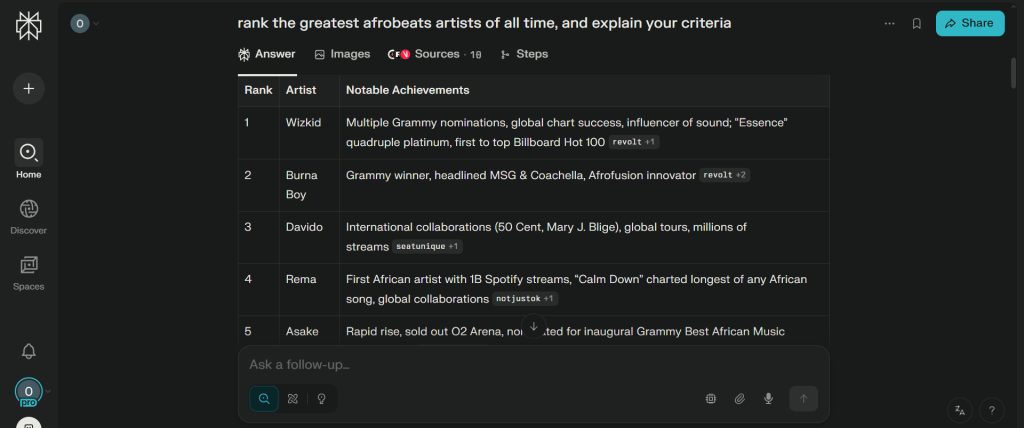
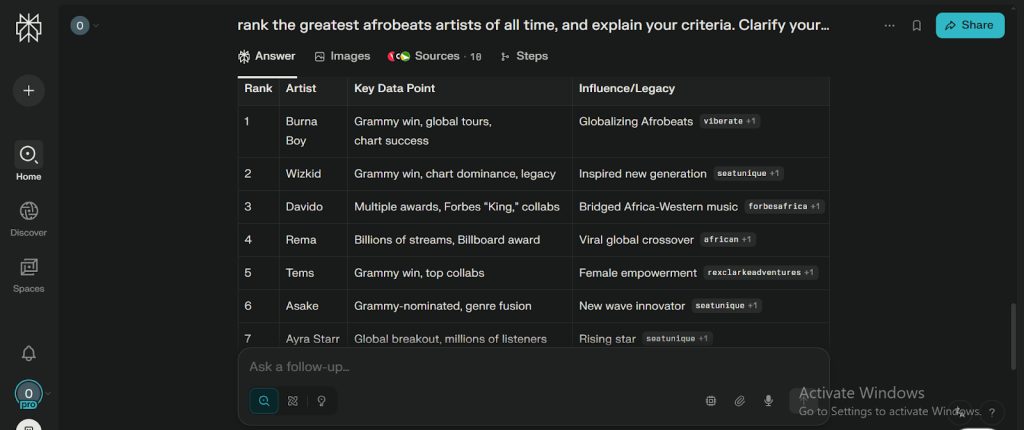
The ranking criteria were just as fluid. At first, the models leaned on unmeasurable factors: pioneering influence, artistry, global reach, and longevity. Meta AI and Perplexity added consistency in producing hits and albums.
But under pressure, the models scrambled for more “objective” grounds—Billboard chart performance, streaming figures, Grammy awards. Each round of questioning forced the bots to rewrite their logic.
Kingsley Owadara, AI ethicist and founder of the Pan-Africa Center for AI Ethics, describes this as the “chain of thought” problem. When AI models respond to a prompt, it doesn’t pull facts from a library. Rather, it guesses what should come next based on the patterns in its training data. That means that if the model is pushed to show its work after its first guess, it starts guessing again. Only this time, it reaches for different explanations which can change its response entirely. Other experts attribute this inconsistency to a lack of structured thinking processes, a direct consequence of how they are desinged.
That might sound like a quirk that can be ignored when debating Afrobeats, but the stakes get higher when these models are used to summarise history, culture, or politics. This trait risks the distortion of reality because the ‘truth’ could change with just a follow-up question.
The global bias
Another striking pattern was how heavily the rankings leaned on global validation. Even when models cited “cultural impact” as a criterion, their reasoning circled back to international recognition: Western awards, collaborations in the UK or US, and mentions in global media.
Grok suggested Burna Boy’s Ye gained traction partly because it shared a title with Kanye West’s album, released months later. For Nigerians, Ye was an anthem following its YouTube release in early 2018. For the model, the song’s significance seemed to exist only through Western reference points.
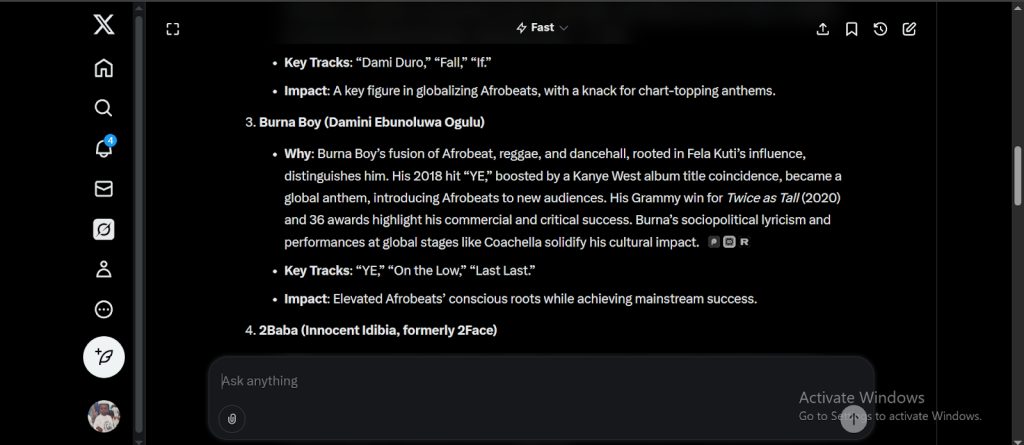
This bias also showed up in the sources. When asked to cite references, the models overwhelmingly leaned on outlets like Rolling Stone, Pitchfork, The New York Times, BBC, and CNN. African publications were nearly invisible. As Owadara explained, “The models draw from data that are overrepresented in their training sets and ignore media outlets that are underrepresented, such as local music blogs.”
He pointed to structural reasons for this: gaps in digitisation, language barriers, limited infrastructure, and the dominance of Western data sources. The effect is that Nigerian culture gets filtered through how it is seen abroad rather than how it is lived at home.
And if Afrobeats—Nigeria’s most visible export—gets reduced to its Western accolades, what chance do less globally visible cultural forms have?
Building African AI
Olajide Philips, co-founder of KorinAI, is trying to answer that question. His team is building what he calls the Large African Music Model (LAMuM), trained on African sounds, cultures, and languages to generate music rooted in the continent’s traditions. Unlike large Western models, KorinAI doesn’t just scrape the internet. Teams travel to villages, sit with elders, and record folk songs and chants that are rarely digitised.
Philips built KorinAI out of frustration with how Western-trained models flatten music into a global—but essentially Western—lens. “The only solution is for Africa to build its own LLM,” he says, “otherwise future generations might start learning a culture that isn’t their own.”
For me, testing these models was less about deciding Afrobeats’ GOAT than about watching how AI interprets Nigerian culture. What the rankings revealed is a reminder: LLMs mirror their training sources. When Western media dominate those sources, what counts most is visibility abroad, not significance at home.
Until Africa builds its own models, the loudest voices in our culture will still come from elsewhere.
Mark your calendars! Moonshot by is back in Lagos on October 15–16! Meet and learn from Africa’s top founders, creatives & tech leaders for 2 days of keynotes, mixers & future-forward ideas. Get your tickets now: moonshot..com











